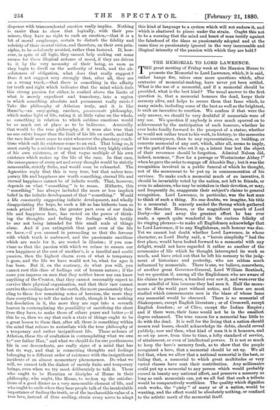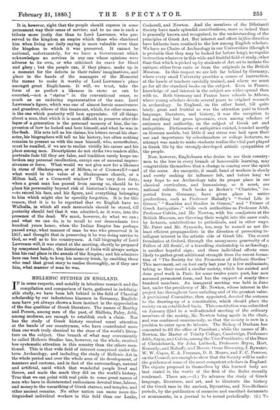THE MEMORTA T, TO LORD LAWRENCE.
great meeting of Friday week at the Mansion House to promote the Memorial to Lord Lawrence, which, it is said, rather hangs fire, raises once more questions which, after centuries of memorial-making, have never yet been settled. What is the use of a memorial, and if a memorial should be provided, what is the best kind ? The usual answer to the first question is, that a memorial honours the dead, keeps their memory alive, and helps to secure them that fame which, to many minds, including some of the best as well as the brightest, is such an incentive to exertion. We confess if that were the only answer, we should be very doubtful if memorials were of any use. We question if anybody is ever much spurred on to achievement by the anticipation of such honours, whether he ever looks fondly forward to the prospect of a statue, whether he would not rather trust to his work, to history, to the memories of his countrymen, than to any representation, or building, or concrete memorial of any sort, which, after all, seems to imply, on the part of those who set it up, a latent fear lest the object of their reverence should be forgotten. Admiral Nelson did, indeed, murmur, "Now for a peerage or Westminster Abbey !" when he gave the order to engage off Aboukir Bay; but it was the recognition involved in a public funeral of which he thought, not of the monument to be put up in commemoration of his services. To make such a memorial much of an incentive, it should be invariably voted by the nation, not left to friends, or even to admirers, who may be mistaken in their devotion, or may, and frequently do, exaggerate their subject's claims to general recognition. Lord Lawrence, in particular, was the last man to think of such a thing. No one doubts, we imagine, his title to a memorial. It scarcely needed the throng which gathered in the Mansion House, or the magnificent speech of Lord Derby—far and away the greatest effort he has ever made, a speech quite wonderful in the curious felicity of its ringing phrases—to make all Englishmen acknowledge that to Lord Lawrence, if to any Englishman, mai honour was due. Yet we cannot but doubt whether Lord Lawrence, in whose character, as Lord Derby said, a "heroic simplicity " had the first place, would have looked forward to a memorial with any delight, would not have regarded it rather as another of the ceremonies of life which he thought interrupted its work so much, and have cried out that he left his memory to the judg- ment of historians and posterity, who are seldom much influenced by memorials. There is one, we believe, somewhere, of another great Governor-General, Lord William Bentinck, but we question if, among all the Englishmen who are aware of his claims to greatness, a hundred ever saw it, and were ever the more mindful of him because they had seen it. Half the monu- ments of the world pass without notice, and those are most studied which commemorate men in the blaze of whose fame any memorial would be obscured. There is no memorial of Shakespeare, except English literature ; or of Cromwell, except English freedom; or of Clive, except the Indian Empire ; and if there were, their fame would not be in the smallest degree enhanced. The tree reason for a memorial has little to do with the dead. It is well for the living that a, nation should mourn real losses, should acknowledge its debts, should reveal publicly, now and then, what kind of man it is it honours, and. so set up anew, from time to time, a lofty standard of service, of attainment, or even of intellectual powers. It is not so much to keep the hero's memory fresh, as to show that the people recognised a hero, that a memorial should be set up. We all feel that, when we allow that a national memorial is the best, or failing that, a memorial to which great multitudes or very varied classes have sent their contribution. Any millionaire could put up a memorial to any person which would probably exceed in beauty any national effort, and preserve a memory as long as such memorials can, yet we all feel that such a tribute would be comparatively worthless. The quality which dignifies such works, the " piety " of many or of a nation, would be wanting, and the effect would be absolutely nothing, or confined to the artistic merit of the memorial itself.
It is, however, right that the people should express in some permanent way their sense of service; and, to no one is such a tribute more justly due than to Lord Lawrence, who pre- served to the kingdom an empire which those who slandered him when living are daily saying is more valuable even than the kingdom to which it was preserved. It cannot be national, unfortunately, for we have a Government which acknowledges no services in any one whose opinions were adverse to its own, or who criticised its crave for blood and glory ; but the people can, if they please, make up in a moment fox the defects in their rulers' iraaginations, and place in the hands of the managers of the Memorial the means to make it worthy of Lord Lawrence's place amongst great EngliAmen. It will, we trust, take the form of as perfect a likeness in stone as can be executed.,—not a " statue " in the conventional sense, so much as an enduring representation of the man. Lord Lawrence's figure, which was one of almost heroic massiveness and grandeur, allows of this treatment, which, for other reasons, is the one which posterity will best appreciate. Of all things about a man, that which it is most difficult to preserve after the lapse of a generation is the personal memory of him, the im- pression of how he looked and bore himself, and what he was in the flesh. His acts tell us his claims, his letters reveal his char- acter, his biographers will tell us his history, but often nothing remains to present us with the man himself, who, nevertheless, must be reoalled, if we are to realise vividly his career and his place among men. Descriptions do not strike two readers alike, portraits fade till they are false, and tradition rarely keeps un- broken any personal recollection, except one of unusual impres- siveness or force. What would we not give now for a likeness in stone of Shakespeare, or of Milton, or of Cromwell ?—and what would be the value of a Shakespeare church, or a Milton hall, or a Cromwell window ? The very first duty, when a great man has passed from among us, should be to place his personality beyond risk of historian's fancy or error, —to record his face, and his figure, and everything belonging to him which might else be speedily forgotten. It is for this reason, that it is to be regretted that we English have no Walhells, in which all such memorials should be stored, till posterity should feel that it was admitted, as it were, into the presence of the dead. We must, however, do what we can ; and what we can do, is to recall to our descendants two hundred years hence, when the Indian Empire has perhaps passed away, what manner of man he was who preserved it in 1857, and thought that in preserving it he was doing service to God, as well as to his countrymen. A full biography of Lord Lawrence will, it was stated at the meeting, shortly be prepared by competent hands; the historians of India will always assign him his real place in the annals of the Empire; and his admirers here can best help to keep his memory fresh, by enabling those who read that great story to realise thoroughly, as if they saw him, what manner of man he was.



































 Previous page
Previous page